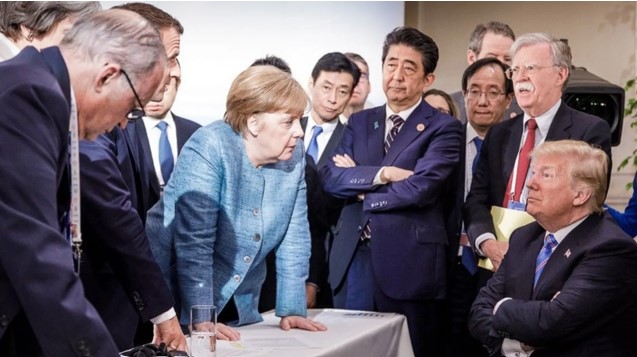
Sometimes a picture says it all. This June 2018 photo shows then German chancellor Angela Merkel beseeching an unmoved President Donald Trump to be reasonable on trade.
He had just imposed 25% punitive tariffs on steel and aluminum and nearly wrecked the annual summit of the Group of Seven—Japan, four European countries, Canada, and the United States. The combative exchange occurred at Charlevoix, Quebec where then-Prime Minister, Justin Trudeau, was hosting the G7.
The meeting was a disaster. Everyone was displeased, Donald Trump was furious. He had arrived late, refused to sign the summit declaration, and departed early. He quarreled with Trudeau, calling the Canadian leader weak and dishonest.
Seven years later
Now seven years later Canada is hosting another G7 summit, this time at a rustic lodge at Kananaskis in the Rocky Mountains. Newly elected Prime Minister Mark Carney for the time being has forgiven Trump for his earlier insults when he said America’s northern neighbour would be better off as a 51st US state.
Similarly, Trump alienated Europeans with his ambiguous stance on the Ukraine war, punishing tariffs, and complaints that Europe doesn’t pay for its own defence.
Kananaskis could be a new beginning for the G7 and for Trump. This most transactional of American presidents has had cordial discussions with summit participants, several of whom are first time summiteers.
He gets along well with Italy’s prime minister, Georgia Meloni, and he’s recently hosted Britain’s Keir Starmer, Japan’s Shiguru Ishiba, and Germany’s Friedrich Merz. In May he met Carney at the White House.
Trump is aware that there’s a bigger summit coming in November: the Group of 20, a gathering of more diverse participants that Cyril Ramaphosa will host in South Africa. Trump himself is due to host the G20 in 2026.
Founded
The Group of 20 was founded in 2008 when a financial crisis triggered a global slowdown. Many feared a downward spiral and worldwide depression. Convinced that co-ordinated economic stimulus was required, then French president Nicolas Sarkozy urged President George W. Bush to convene an emergency summit of advanced and developing countries who could act together to avert disaster.
By 2009 there was a co-ordinated global response, as trade expanded and dozens of countries began to register resumed growth.
With China, India, Brazil, Indonesia, South Africa, Saudi Arabia, and South Korea now included in this new global steering body, it was assumed that the G7 would be merged into the G20. That didn’t happen and as years went by, differences within the G20 became pronounced.
Absent a crisis, the G20 found it hard to forge consensus on issues as disparate as climate, global governance and economic policy. A new grouping—BRICS (Brazil, Russia, India, China, South Africa)—emerged to promote greater say for developing countries.
Security
Security matters have come to dominate G7 and G20 gatherings. Russia was brought into the G7 in 2002 but its annexation of Crimea in Ukraine triggered outrage, and in 2014 it was ousted from what had become a G8.
Sanctions were imposed against Russia, but efforts to end the three-year long Ukraine war failed.
President Trump is no friend of multilateral entities. In 2020 he complained about the G7’s “very outdated” format. He said that Russia, Australia, South Korea, and India should become members. His summit partners disagreed.
Fifty years after the first G7 summit, the post-World War Two economic order is wobbling. For many, a rising China has become more adversary than partner. There’s a trade war between the US and China, the global role of the dollar is challenged, trade rules are ignored, and an emerging consensus on combating climate change is breaking down.
Bob Hormats, formerly a summit planner for both Republican and Democratic American administrations, says despite shortcomings G7/G20 summits are useful. “They seldom produce big breakthroughs,” he says, “but they can reduce friction and forge common understandings.”. It’s important that leaders get to know each other.
Will the G7 and G20 rise to the challenge and regain eroded credibility? Will either promulgate and implement policies that win global support? Will Donald Trump be a disrupter?
Always there are new issues—war and peace, artificial intelligence. But the more things change, the more they stay the same. Case in point: as in 2018, summits in 2025 will grapple with disruptive, damaging 25% (and higher) tariffs imposed by President Donald Trump. #
Barry D. Wood has reported from nearly two dozen G7/G20 summits.
The views of the writer are not necessarily the views of the Daily Friend or the IRR.
If you like what you have just read, support the Daily Friend

